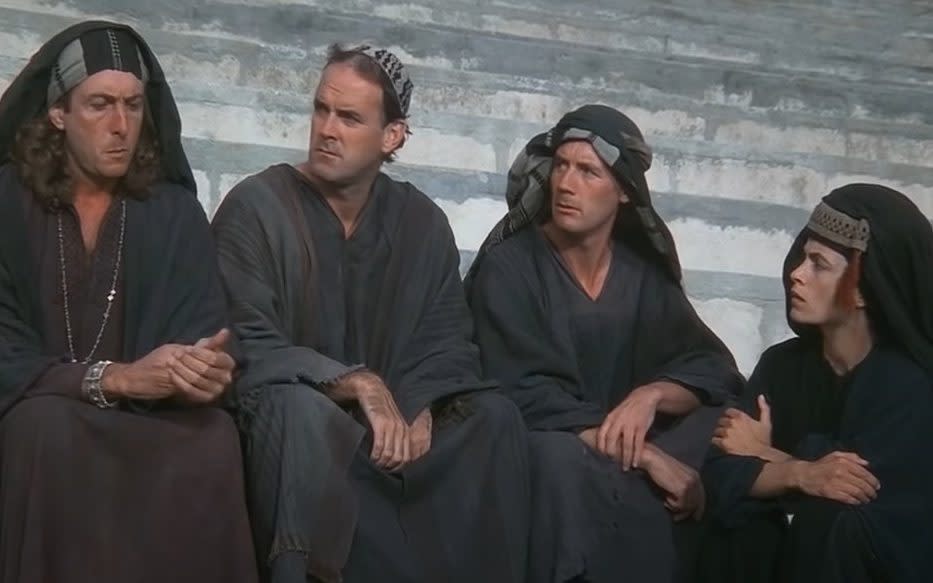It’s daft to ditch Life of Brian’s Reg/Loretta skit – the film’s least controversial gag

- Oops!Something went wrong.Please try again later.
- Oops!Something went wrong.Please try again later.
John Cleese isn’t looking on the bright side of life. The comedian says he was forced to cut from his upcoming theatre adaptation of Monty Python’s The Life Of Brian, a joke in which a man called Stan says he wants to be called Loretta and to have babies. In the movie, Cleese, playing a character named Reg, says it is “impossible” for Stan, portrayed by Eric Idle, to have children. “I’m not oppressing you, Stan,” he says. “You haven’t got a womb! Where’s the foetus going to gestate?! You going to keep it in a box?!”
Cleese says other performers told him the gag had to go, saying, “We love the script, but you can’t do that stuff about Loretta nowadays.”
The comedian, 83, explained this during a recent one-person show: “So here you have something there’s never been a complaint about in 40 years that I’ve heard of, and now all of a sudden we can’t do it because it’ll offend people. What is one supposed to make of that?”
Life Of Brian was hugely controversial on its release in 1979 – but not because someone named Stan was eager to give birth. The uproar was over its perceived lampooning of Christianity (in fact, the film was a critique of blind faith rather than an attack on religion itself). With several councils banning the film on the grounds it was blasphemous, and rabbis and nuns picketing screenings in New York, nobody was paying attention to Stan and his desire to become Loretta and to start a family.
Thirty years later, does the joke have to go? That would be to assume Monty Python were laughing outright at Idle’s character – that Stan/Loretta was the punchline, Cleese the voice of reason. But Python’s humour was always more subtle than that.
To take another example in the movie, a reluctant bystander named Brian is mistaken for the Messiah. He grows increasingly frustrated when people refuse to accept his insistence that he’s just another nobody. Python weren’t deriding the idea of a Messiah, they argued that nothing in life was ever black and white and that people promising easy solutions to complex issues – for instance, the Roman occupation of Judea – were selling snake oil.
Watched today; the Reg/Loretta sequence is self-evidently played for laughs. Idle, however, seems to be entirely serious when he says that, as Stan, he wants to be Loretta. He isn’t winking at the audience. The sketch must also be understood in the context of the characters’ membership of the perpetually bickering People’s Front of Judea. What’s being mocked is the tendency of those on the political extremes to fall out over irrelevancies – such as Stan’s wish to have babies – and to ignore the bigger picture of the Roman hegemony.
Uniquely among the surviving Pythons, Cleese seems uneasy with his status as a comedic elder statesman and has been reluctant to go quietly into the night. He has railed on Twitter against what he called cancel culture, while his announcement that he was to revive his classic comedy Fawlty Towers with his daughter Camilla has provoked horror – why try to re-paint a masterpiece?
The new production of Life of Brian, overseen by director Caroline Jay Ranger, is set to open in London in 2024. In contrast to the original movie, however, this is a one-Python project. Idle has distanced himself, insisting, “I have nothing to do with this production or adaptation.”
I have nothing at all to do with this production or adaptation,. Apparently Cleese has cut the song. Of course. https://t.co/OS1X9b5w2k
— Eric Idle (@EricIdle) May 19, 2023
Cleese feels strongly that comedians can crack wise about whatever they wish. In that regard, his opinion had not changed since the Seventies when he was at the height of his powers, creating and starring in Fawlty Towers and teaming up with the rest of Python for the unsurpassable triple-whammy of Monty Python and the Holy Grail, Life of Brian and the Meaning of Life.
Idle takes the opposite view regarding modern humour, saying it was up to your public to judge whether a joke works. “You shouldn’t moan about the audience. There’s nothing wrong with the audience. If they don’t laugh at your jokes, there’s something wrong with your joke. And so… I’m not terribly sympathetic to that attitude, to be honest.” That said, he has expressed dismay that the crucifiction scene may also been cut from the new stage production.
Whatever audiences today may think, in 1979, nobody thought twice about the Reg/Loretta skit. Frankly, it was the least controversial gag in the entire movie. If there is any justification for its inclusion today, it may be as a reminder of how much comedy has changed in the decades since.

